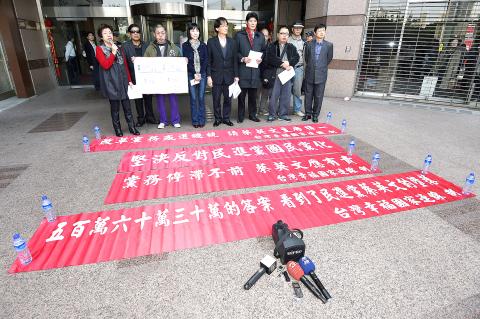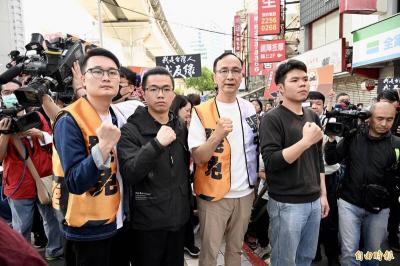A group of Democratic Progressive Party (DPP) members yesterday rallied outside party headquarters in Taipei, protesting against the newly released schedule and regulations for nominating the candidate for next year’s presidential election.
“The DPP officially released its regulations on nominating the next presidential candidate today, and the registration process for the primary begins tomorrow,” DPP member Ku Wen-fa (古文發), who organized the demonstration with about 30 DPP members as the party’s routine Central Standing Committee meeting was taking place, told reporters.
“We, as DPP members, were never consulted during the decisionmaking process, so this is a non-transparent decisionmaking process and is against the party’s core values of being ‘democratic’ and ‘progressive,’” he said.

Photo: Chen Chih-chu, Taipei Times
In addition, Ku said that whoever intends to sign up for the primary has to pay a NT$4 million (US$127,000) registration fee, plus another NT$1 million for poll surveys on support rates.
“What would you call it other than ‘money politics’?” Ku asked. “This is not what the nation’s major opposition party, which receives NT$100 million in subsidies from the government a year, should do.”
Ku said that he organized the protest not because he is against DPP Chairperson Tsai Ing-wen (蔡英文) or supports a DPP politician who plans to run against her.
“We are doing so for the good of the party,” he said.
The protesters were met by DPP Department of Social Movements Deputy Director Chen Tzu-yu (陳子瑜), who promised to refer their petition to Tsai.
“We are certainly not satisfied with the party’s response, but we will wait, and we will come back again if the party cannot give any satisfying promise in the end,” Ku said, adding that he has prepared NT$10 million in cash, and will discuss with fellow protesters to see if he should sign up for the primary himself.

The Ministry of Economic Affairs has fined Taobao NT$1.2 million (US$36,900) for advertisements that exceeded its approved business scope and ordered the Chinese e-commerce platform to make corrections in the first half of this year or its license would be revoked. Lawmakers have called for stricter supervision of Chinese e-commerce platforms and more stringent measures to prevent China from laundering its goods through Taiwan as US President Donald Trump’s administration cracks down on origin laundering. The legislature’s Finance Committee yesterday met to discuss policies to prevent China from dumping goods in Taiwan, inviting government agencies to report on the matter. Democratic Progressive Party

Taiwan and its Pacific ally Tuvalu on Tuesday signed two accords aimed at facilitating bilateral cooperation on labor affairs, according to Taiwan’s Ministry of Foreign Affairs (MOFA). The governments inked two agreements in Taipei, witnessed by Foreign Minister Lin Chia-lung (林佳龍) and visiting Deputy Tuvaluan Prime Minister Panapasi Nelesone, MOFA said in a news release. According to MOFA, the agreements will facilitate cooperation on labor issues and allow the two sides to mutually recognize seafarers’ certificates and related training. Taiwan would also continue to collaborate with Tuvalu across various fields to promote economic prosperity as well as the well-being of their

Taiwan would welcome the return of Honduras as a diplomatic ally if its next president decides to make such a move, Minister of Foreign Affairs Lin Chia-lung (林佳龍) said yesterday. “Of course, we would welcome Honduras if they want to restore diplomatic ties with Taiwan after their elections,” Lin said at a meeting of the legislature’s Foreign Affairs and National Defense Committee, when asked to comment on statements made by two of the three Honduran presidential candidates during the presidential campaign in the Central American country. Taiwan is paying close attention to the region as a whole in the wake of a

The Taipei District Prosecutors’ Office has continued its investigation into allegations of forged signatures in recall efforts today by searching the Chinese Nationalist Party’s (KMT) city chapter and questioning several personnel including the chapter director, according to media reports. Among those questioned and detained were KMT Taipei chapter director Huang Lu Chin-ju (黃呂錦茹), chapter secretary-general Chu Wen-ching (初文卿), chapter secretary Yao Fu-wen (姚富文) and first district committee executive director Tseng Fan-chuan (曾繁川). Prosecutors said they would not confirm reports about who had been summoned. The investigation centers on allegations that the ongoing recall campaigns targeting Democratic Progressive Party legislators Rosalia Wu (吳思瑤)